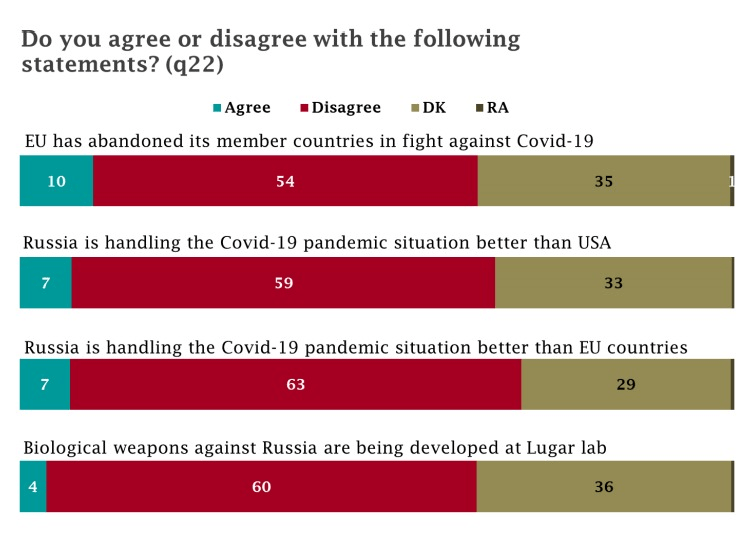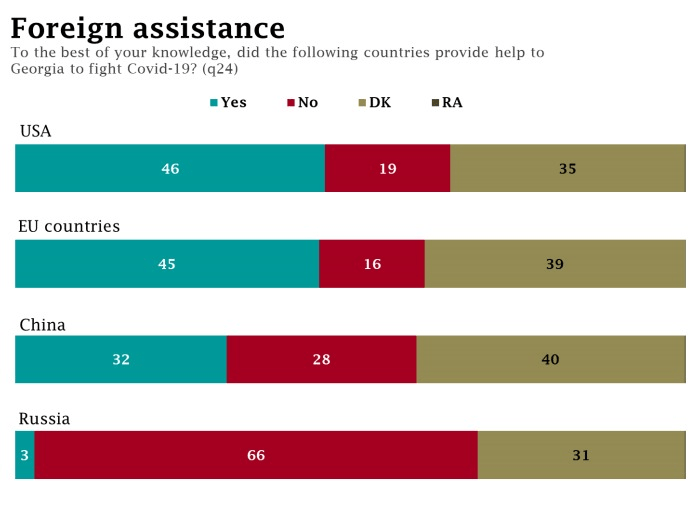COVID, Disinformation, and Foreign Policy Attitudes in NDI Poll
National Democratic Institute (NDI) has released its public opinion survey results, which shows respondents’ attitudes towards a broad range of issues, among them COVID-19 and disinformation and attitudes towards EU and NATO amid pandemic.
The survey was fielded by the Caucasus Resource Research Centers (CRRC) for NDI between June 26 and June 30 with the financial assistance of the UK Aid, and was carried out through nationwide mobile phone interviews (excluding occupied territories) with 1,550 respondents and has an average margin of error plus, minus 2%. In addition, 10 focus groups were conducted during June 24-30 in five cities, Tbilisi, Zugdidi, Batumi, ethnic-Azeri majority Marneuli, and ethnic-Armenian majority Akhalkalaki.
Sources of Information and Trust
According to the survey, Georgians “are concerned about the quality of information around the COVID-19 pandemic, but confident in their own ability to see through false narratives.”
81% of respondents named TV as the main source of information about the pandemic, followed by 41% opting for social networks and 26% for neighbors, friends, family members.
Regarding trusted sources of information on the virus, most Georgians trust the National Center for Disease Control (NCDC) – 90%, the Georgian Government – 85%, Journalists – 73%, local government – 66%, and religious leaders or the church – 61%.
33% of the respondents find it difficult to determine what is true or not when getting news about the public health crisis, as opposed to 60% that finds it easy to determine what is true and what is not.
While explaining Georgia’s relative success in handling pandemic, 73% agree with the statement that “this situation in Georgia is mostly due to the correct steps by the government and doctors” as opposed to 17% thinking that “this situation in Georgia is mostly due to our genetics and religion.”
“The preventive measures were introduced very quickly, the borders were closed down and as it turned out, we, Georgians were not as unorganized as we thought we were. All this led to good results,” the focus group participant, man, 28 from Tbilisi said.
Disinformation and Conspiracies
Asked about the origin of COVID-19, 13% of the surveyed persons say it came about naturally; 30% think the virus was developed in a lab and spread intentionally, 22% believe it was made in a lab and spread accidentally, 3% says it does not really exist. 32% said they do not know.
Speaking of the role of NCDC’s Lugar Center for Public Health Research, that had again become the target of a Russian disinformation campaign during the pandemic, 66% of respondents said Lugar Center “is preventing the spread of COVID-19,” as opposed to 4% saying that it is “contributing to the spread of COVID-19.” 6% have not heard of Lugar Center, while 17% do not know.
“I have heard on TV that Russia has suspicion that Lugar lab is producing weapons against them. I really don’t think this is true, but if it was – I would be on board with it,” said one of the focus group participants, a 66-year-old man from Tbilisi.
Asked whether “natural remedies” (such as drinking hot water, vodka, eating garlic) can be used as a cure against the virus, 78% Georgians say no, as opposed to 19% saying yes.
Asked if they would vaccinate themselves and their kids if the COVID-19 vaccine existed, 38% said yes, 46% said no, 15% do not know.
Regarding the 5G conspiracy, 10% agree with the statement that “5G infrastructure is linked to the spread of COVID-19,” 45% disagrees, 16% has never heard of 5G and 30% does not know.

29% of the surveyed people believe that there is a certain foreign country that intentionally spreads disinformation about COVID-19 in Georgia, as opposed to 35% that says there is no such country. 36% said they do not know.
Of the 29% who believe a certain foreign country is spreading disinformation about the pandemic in Georgia, 36% do not know which country it is, 33% named Russia, 27% named Armenia, 11% named China.
Faith and Virus
According to the survey, only 10% of the Orthodox Christians reported that they attended Easter Liturgy in the church.
Responding to the statement “faith protects believers of my religion from getting infected with the COVID-19” 53% of the respondents agreed and 38% disagreed.
Tbilisites and people between 18-34 are more likely to disagree with the statement.

EU, NATO Support
76% of Georgians approve the Georgian Government’s stated goal to join the European Union, down with 6% from November 2019.
Answering how the pandemic changed their attitudes towards the EU, 19% says “changed to more positive,” 9% says “changed to more negative,” 61% says it did not affect them at all.
69% of the surveyed people endorse Georgia’s stated goal to join NATO, 5% decrease from November 2019.

In addition, 59% of the respondents agree with the statement that “Georgia will benefit more from European and Euro-Atlantic integration.” 11% says “Georgia will benefit more from abandoning European and Euro-Atlantic integration in favor of better relations with Russia.” 12% agrees with neither statement, while 16% does not know.
Young people – 18-34 – are most likely to endorse European and Euro-Atlantic integration, and least likely to favor better relations with Russia at the expense of European and Euro-Atlantic integration.
Also read:
- Tbilisi Decries Russian Disinformation over Lugar Center
- Orthodox Church Defies Some Emergency Rules amid Pandemic
- “Georgia’s Minorities Have Diverging Views on EU, NATO” – Interview with NDI’s Laura Thornton
- Kremlin Disinformation Threatens Georgia’s Western Integration
This post is also available in: ქართული (Georgian) Русский (Russian)